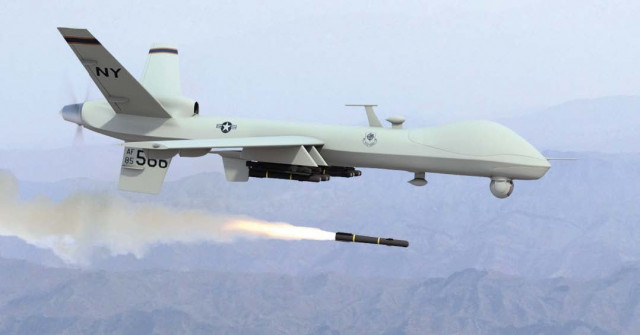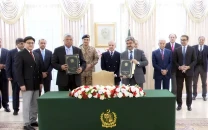Implications of drone attacks increase unclear
Experts disagree over what it means for US-Pakistan ties.

Implications of drone attacks increase unclear
“Americans seem to have realised now that they have to do it themselves…they are using their options after concluding that Pakistan will never play ball,” said Brigadier (retd) Muhammad Saad, a Peshawar-based security analyst.
Saad, who served in the Pakistan military, said the US might be exploring options after Islamabad’s refusal to take on the Haqqani network and drone-attacks represent one of Washington’s best bets. “By more drone strikes the Americans are simultaneously putting pressure on both Pakistan and the group,” said Saad.
Another expert had a contradictory perspective on the drones. “Cynically, you can say it indicates more bad blood between US and Pakistan,” said Fida Khan, a journalist who has covered the war on terror over the last decade for a Japanese publication. “But it can easily be concluded the other way round. I think it is in the interests of both countries that the Taliban gets weaker before entering into negotiations for an ultimate fix in Afghanistan.” Khan added that Pakistan would face difficulty dealing with the “powerful” Haqqanis after the US left Afghanistan.
Khan also pointed out that the escalation coincides with US Special Envoy Mark Grossman’s visit to Islamabad. The drone hits, which now touch the 300 mark, have of late specifically targeted individuals associated with the Haqqani network, a group of Afghan militants Washington blames for much of the violence in Afghanistan against international forces.
According to reports, one such strike on last Friday killed a 28-year-old Egyptian man named Abdullah who helped handle the Haqqani network’s finances in Pakistan and Afghanistan, said the intelligence officials. He was known locally as Nadeem.
On Thursday, a missile attack close to Miranshah killed Janbaz Zadran, who US officials said was a top commander in the network, helping to orchestrate attacks in Kabul and southeastern Afghanistan.
Saad said Pakistan would have to come up with a clear policy on Afghanistan and the best way for Islamabad was to give the world’s superpower a safe passage out of the war zone it is eager to leave.
For that, Fida Khan argued, marginalisation of the Taliban, whether the group led by Mullah Omar or Jalaluddin Haqqani, would be the first step. Khan added that Pakistan’s ultimate worry over Afghanistan was to counter Indian influence there, and if the US had given Islamabad some firm guarantees the establishment here might agree to plans to weaken the Taliban.
Brigadier (Retd) Mahmoud Shah, another Peshawar-based analyst, said he did not believe that this escalation was the result of any cooperation or a new arrangement between Islamabad and Washington.
Published in The Express Tribune, October 17th, 2011.



















COMMENTS
Comments are moderated and generally will be posted if they are on-topic and not abusive.
For more information, please see our Comments FAQ